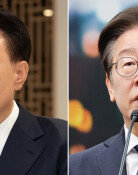‘Forced labor issue will be resolved before summer,’ says S. Korea
‘Forced labor issue will be resolved before summer,’ says S. Korea
Posted January. 16, 2023 07:40,
Updated January. 16, 2023 07:40
On Saturday (local time), Japanese Prime Minister Fumio Kishida said, “We have reached an agreement with Korean President Yoon Suk Yeol and have been engaging in communications with South Korea’s diplomatic authorities to swiftly resolve the ongoing issue of compensating victims of forced labor during Japan's colonization of Korea. We’re committed to restoring healthy relations between the two countries.”
In his earlier speech at Johns Hopkins University in the U.S. on Friday, he emphasized, “We will swiftly resolve pending issues between Japan and South Korea. We will strengthen security cooperation with South Korea and the U.S. in response to the North Korean threat.” This statement is interpreted as his will to resolve the forced labor issue quickly. The Japanese newspaper Yomiuri Shimbun interpreted this, “Kishida expressed expectations for a solution of the South Korean government.”
An official of the South Korean Ministry of Foreign Affairs said regarding Prime Minister Kishida's remarks, “During the Korea-Japan summit last year (November), both leaders had confirmed their commitment to promptly resolve pending issues and improve relations between the two nations.”
In light of recent developments, Seo Min-jeong, Director General of the Asian and Pacific Bureau of the South Korean Ministry of Foreign Affairs, visited Japan on Sunday to hold a high-level meeting with Takehiro Funakoshi, Director General of the Asian and Oceanian Affairs Bureau of the Japanese Ministry of Foreign Affairs on Monday. The South Korean government has already outlined a solution for the forced labor issue and will urge Japan to take "sincere measures" in response.
According to recent reports, the South Korean government is considering the possibility of President Yoon’s visit to Japan for a Korea-Japan summit in February, if early. The Japanese government is reportedly contemplating inviting President Yoon to the G7 summit scheduled to be held in Hiroshima in May. However, it is reported that specific coordination has not been made between the two countries.
Meanwhile, U.S. President Joe Biden held a summit with Kishida at the White House on Friday and expressed strong support for the revision of Japan’s national security strategy, which stipulates Japan’s ability to attack enemy bases (counterattack ability). “We are modernizing our military alliances, building on Japan's historic increase in defense spending, and new national security strategy,” said Biden. “Let me be crystal clear: The United States is fully, thoroughly, completely committed to the alliance, and importantly ... to the defense of Japan.”
“To make sure that extended deterrence will remain unwavering, we concurred to keeping close touch, including on the ministerial level, between our two countries,” said Biden and Kishida in a joint statement. “The Indo-Pacific faces growing challenges, from actions inconsistent with the rules-based international order by China to provocations by North Korea. We strongly oppose unilateral attempts to change the status quo by force or coercion.”
sanghun@donga.com · journari@donga.com







